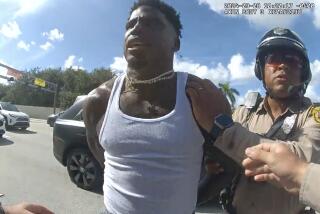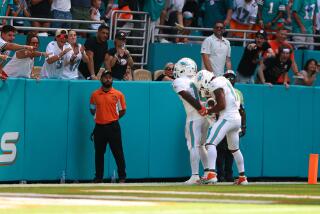Taser use again in dispute
- Share via
HOUSTON — Fred Weary, a pro football player for the Houston Texans, was driving his maroon Chevy Impala SS last month when he was pulled over by police after failing to signal that he was changing lanes.
What happened next is in dispute. Police say Weary was “verbally combative” and did not put his hands on his car when ordered. The 305-pound offensive lineman says he did what the officers told him. But one thing is clear: Like many black men in this city, Weary was zapped with a stun gun and cuffed as he lay motionless on the ground.
The highly publicized case has brought attention to some stark statistics about police use of Tasers in the nation’s fourth-largest city: Nearly two-thirds of those shocked with the high-voltage weapons over the last two years were black.
And the resulting outcry from black community activists and a City Council member has led Mayor Bill White to call for an independent review of Taser use by the Houston Police Department.
“The mayor took a positive first step, but what will he do when the information comes back and clearly shows that race is a direct factor in who gets Tasered?” said Quanell X, a community activist and leader of the New Black Panther Nation. “We already know that African Americans are Tasered more often than whites.”
Quanell X saw blatant racism in the split-second decision by an officer to use a Taser on Weary during his Nov. 14 traffic stop: “This was a small white woman who was intimidated by a big black man and panicked,” he said.
At a town hall meeting set for today, Quanell X said, he plans to highlight cases of people shocked by stun guns -- including one in which a black man who was having an epileptic seizure was Tasered for failing to comply with an officer’s orders.
Shortly after the Weary incident, a UCLA student of Iranian descent was repeatedly shocked by campus police after refusing to exit a student library. The two events have revived a national debate about proper use of Tasers, promoted as a tool law enforcement officers can use to subdue unruly people without injuring them.
Houston police officers are permitted to use Tasers any time they feel physically threatened by a suspect. Every such use is then reviewed by top department brass. Since the city began using the weapons in December 2004, no one has been seriously injured by an electrical jolt, department spokesman John Cannon said. “This is the most scrutinized weapon in the Houston Police Department.”
Though African Americans make up about 23% of Houston’s population, Cannon said, they account for about half of the arrests in the city. Therefore, he said, the fact that 620 of the 982 suspects Tasered since 2004 were black was not statistically out of line. He added that “a handful” of officers had been reprimanded for using the weapons without proper cause.
In an opinion piece in the Houston Chronicle on Saturday, Police Chief Harold L. Hurtt defended his department’s Taser policies, saying that using stun guns instead of handguns has saved lives.
Even before Weary’s arrest, Houston Councilwoman Ada Edwards had called for a review of the department’s Taser policies and a study on the medical consequences of being shocked with stun guns. City Controller Annise D. Parker had planned to audit the stun gun program to analyze officer training and use of the weapons compared with other cities.
Critics in Houston have said that the Tasers are used too often -- particularly against black suspects -- and that those who were shocked often did not pose a serious threat.
A judge has dismissed charges that Weary, 29, resisted arrest, finding that he did not use force against the officers when he was pulled over about 1 p.m. for failing to use his turn signal and not having a front license plate. Prosecutors have not ruled out filing other charges after re-examining police radio calls and other evidence.
Weary, who expressed anger and frustration after his arrest, has maintained that he did nothing to provoke the officers. His lawyer, Charley Davidson, did not return requests for comment.
More to Read
Sign up for Essential California
The most important California stories and recommendations in your inbox every morning.
You may occasionally receive promotional content from the Los Angeles Times.













